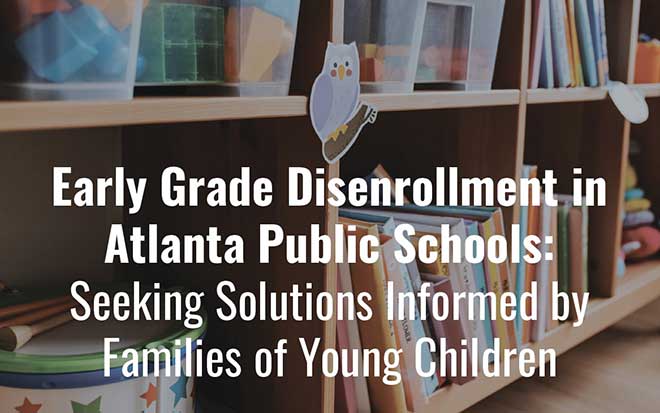Jan. 28, 2025
Early Grade Disenrollment in Atlanta Public Schools: Seeking Solutions Informed by Families of Young Children
Large urban school districts are currently facing a decline in early grade student enrollment as well as increased disenrollment, particularly among children and families of color and those living in poverty. This outcome has only become more acute since the COVID pandemic, exacerbating numerous barriers to regular school attendance and engagement for families nationwide. As chronic absenteeism continues to affect K-12 students, it is important to emphasize the lasting impact that consistent attendance and intentional early learning engagement can have on a child's educational journey.
This report specifically examines Atlanta Public Schools, a district facing increased chronic absenteeism and disenrollment in the early grades, to uncover and address the critical issues its children and families face. Working directly with district leadership and their community partners, this report builds upon our previous study of early grades transition to address drivers of absenteeism and disenrollment by providing recommendations centered around the following categories:
- Enrollment Procedures and Attendance Policies
- Robust Family Engagement to Restore Trust
- Responsive and Engaging Learning Environment
- Individual Family Support
- Continuous Evaluation and Improvement
Informed by focus groups, interviews, and extensive literature review, the report provides distinct, actionable recommendations to Atlanta Public Schools that may also be replicated by similar districts facing attendance and disenrollment challenges to re-engage families, and meet the needs of the children they serve.
Key Points:
- Chronic absenteeism in early grades significantly affects future attendance patterns. However, establishing early attendance expectations and support systems can reduce the risk of future absenteeism or disenrollment in later grades.
- School districts must reassess enrollment and attendance policies to eliminate barriers that hinder families from enrolling their children while ensuring clear communication of this information, particularly in the wake of COVID-19,.
- Schools and families should maintain open communication to identify and address the academic and non-academic needs of children. This relationship must be a trust-based partnership with mutual support and understanding.
- Addressing chronic absenteeism requires a comprehensive, collaborative effort between city government, district and school staff, and families to eliminate barriers like housing, transportation, and safety concerns that hinder regular attendance.



